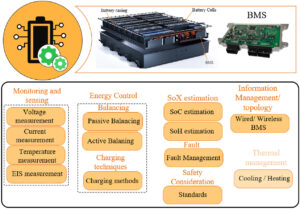The MOBI-EPOWERS Research Group at Vrije Universiteit Brussel has released a new publication. This research offers an in-depth exploration of the latest advancements in Battery Management Systems (BMS), highlighting key challenges and future directions in the field.
The paper provides valuable insights into the evolving role of BMS and its connection to the emerging battery passport concept. It reflects the contributions of several academic and industrial partners, including the University of Ljubljana, TNO, AVL, and AVL-SFR, who have played a significant role in advancing innovative BMS technologies.
Written by: Pegah Rahmani, Sajib Chakraborty, Igor Mele, Tomaž Katrašnik, Stanje Bernhard, Stephan Pruefling, Steven Wilkins, Omar Hegazy
Highlights:
- Review of future-proof BMS focusing on hardware, software, safety and performance
- BMS real-world challenges: modelling, aging, fault tolerance and fast charging.
- Future technologies: V2X, battery swapping, advanced SoX and cyber-secured BMS.
Abstract: To date, a variety of Battery Energy Storage Systems (BESS) have been utilized in the EV industry, with lithium-ion (Li-ion) batteries emerging as a dominant choice. Li-ion batteries have not only captured the automotive market but have also exponentially been used in stationary energy storage sectors, thanks to their extended service life, high power, and volumetric density. The surge in Li-ion battery demand, increasing by approximately 65 % from 330 GWh in 2021 to 550 GWh in 2022, is primarily attributed to the exponential growth in electric vehicles sales. However, despite extensive research in academia and industry on Battery Management Systems (BMS), several gaps persist. Challenges include optimizing battery utilization within real-world operational limits, adapting BMS concerning chemical changes within batteries, e.g., aging, addressing the complexities of cell balancing in future battery packs, restricting fast charging below room temperature, limitations in fault tolerance capabilities, and the tendency to oversize for safety margins. Furthermore, the integration of efficient models (i.e., physics/data) with cutting-edge sensing technology remains a challenge as current BMS are often isolated and disconnected, narrowing the operational limits of battery systems for EV and stationary energy storage applications. This paper conducts a comprehensive review covering all possible aspects of BMS soft- and hardware solutions for EV applications, focusing on technical performance, safety, and reliability. Topics covered physics- and data-based modelling approaches for edge and cloud, state-of-X (SoX) estimation methods, charging strategies, balancing techniques, fault diagnostics, safety considerations, warranty management, and Vehicle-to-Everything (V2X) capabilities. Additionally, the paper sheds light on emerging technologies and future opportunities in this related field.

To access the full paper, please click here.


